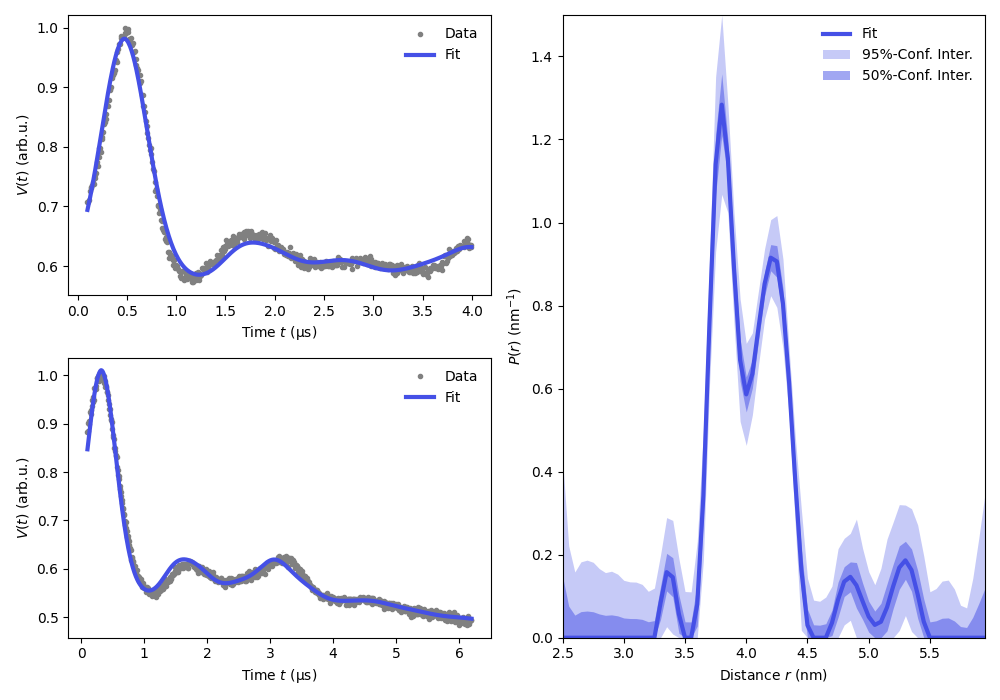Note
Go to the end to download the full example code.
Global fitting of multiple different DEER signals¶
How to fit multiple signals from different DEER experiments to a model with a non-parametric distribution and a homogeneous background, using Tikhonov regularization.
import numpy as np
import matplotlib.pyplot as plt
import deerlab as dl
# File location
path = '../data/'
file4p = 'example_4pdeer_2.DTA'
file5p = 'example_5pdeer_2.DTA'
# Experimental parameters (4pDEER)
tau1_4p = 0.5 # First inter-pulse delay, μs
tau2_4p = 3.5 # Second inter-pulse delay, μs
tmin_4p = 0.1 # Start time, μs
# Experimental parameters (reversed 5pDEER)
tau1_5p = 2.9 # First inter-pulse delay, μs
tau2_5p = 3.3 # Second inter-pulse delay, μs
tau3_5p = 0.3 # Third inter-pulse delay, μs
tmin_5p = 0.1 # Start time, μs
# Load the experimental data (4pDEER)
t4p,V4p = dl.deerload(path + file4p)
V4p = dl.correctphase(V4p) # Phase correction
V4p = V4p/np.max(V4p) # Rescaling (aesthetic)
t4p = t4p - t4p[0] # Account for zerotime
t4p = t4p + tmin_4p
# Load the experimental data (reversed 5pDEER)
t5p,V5p = dl.deerload(path + file5p)
V5p = dl.correctphase(V5p) # Phase correction
V5p = V5p/np.max(V5p) # Rescaling (aesthetic)
t5p = t5p - t5p[0] # Account for zerotime
t5p = t5p + tmin_5p
# Run fit
r = np.arange(2.5,6,0.05)
# Construct the individual dipolar signal models
V4pmodel = dl.dipolarmodel(t4p,r,experiment=dl.ex_4pdeer(tau1=tau1_4p,tau2=tau2_4p,pathways=[1,2,3]))
V5pmodel = dl.dipolarmodel(t5p,r,experiment=dl.ex_rev5pdeer(tau1=tau1_5p,tau2=tau2_5p,tau3=tau3_5p,pathways=[1,2]))
# Make the joint model with the distribution as a global parameters
globalmodel = dl.merge(V4pmodel,V5pmodel,addweights=True)
globalmodel = dl.link(globalmodel, P = ['P_1','P_2'])
# Fit the model to the data (with fixed regularization parameter)
results = dl.fit(globalmodel,[V4p,V5p], weights=[1,1])
plt.figure(figsize=[10,7])
violet = '#4550e6'
# Extract fitted distance distribution
Pfit = results.P
Pci95 = results.PUncert.ci(95)
Pci50 = results.PUncert.ci(50)
for n,(t,V) in enumerate(zip([t4p,t5p],[V4p,V5p])):
# Extract fitted dipolar signal
Vfit = results.model[n]
plt.subplot(2,2,1+n*2)
# Plot experimental data
plt.plot(t,V,'.',color='grey',label='Data')
# Plot the fitted signal
plt.plot(t,Vfit,linewidth=3,color=violet,label='Fit')
plt.legend(frameon=False,loc='best')
plt.xlabel('Time $t$ (μs)')
plt.ylabel('$V(t)$ (arb.u.)')
# Plot the distance distribution
plt.subplot(1,2,2)
plt.plot(r,Pfit,linewidth=3,color=violet,label='Fit')
plt.fill_between(r,Pci95[:,0],Pci95[:,1],alpha=0.3,color=violet,label='95%-Conf. Inter.',linewidth=0)
plt.fill_between(r,Pci50[:,0],Pci50[:,1],alpha=0.5,color=violet,label='50%-Conf. Inter.',linewidth=0)
plt.legend(frameon=False,loc='best')
plt.autoscale(enable=True, axis='both', tight=True)
plt.xlabel('Distance $r$ (nm)')
plt.ylabel('$P(r)$ (nm$^{-1}$)')
plt.tight_layout()
plt.show()

Total running time of the script: (0 minutes 39.814 seconds)